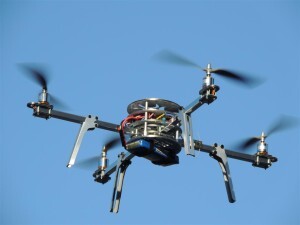First published in Flight Levels Online, Winter 2014 issue

It was early Christmas morn, 2013, and a young Jack Isley opened his final and favorite Santa gift –– a Quad-Copter with four-channel remote control. After the obligatory 90-minute battery charge, the “Quad” (that’s what the kids are calling them these days) was ready to fly.
Although the device was designed to be enjoyed in any indoor or outdoor environment, navigating the confined spaces of the home proved to be very difficult to master. “Dad, can I take it outside, where I have more room?” the young lad requested. “No son, you need to improve your skills indoors, or you’ll get it stuck in a treetop somewhere,” his father rebuffed, with the salty wisdom of a man with a dozen Frisbees and tennis balls clogging his gutters.
An hour or so went by, and as the young boy’s attention inevitably shifted to another toy, his father snuck outside with the new copter. Moments later, the Quad lifted –– sprang, really –– into the air, its vigor aided by a freshly-charged battery. The father honed his maneuvering skills, dodging neighborhood mailboxes, tree branches, and basketball goals. Confident in his piloting skills, now it was time to test the envelope.
With more throttle came more altitude, enough, in fact, that soon the copter was a mere glint in the December sky. When the newly-minted UAV operator realized that the toy would soon disappear entirely, he cut the throttle, fully anticipating the copter to return, however suddenly, back to earth. Somehow, though, quite the opposite occurred. The Quad continued climbing until it was out of sight.
A lengthy search of neighbors’ backyards and rooftops turned up nothing. Head hanging low, the once-proud father returned home. “Son, you’re not going to like this,” he addressed the boy calmly. “Dad, did you break my helicopter?” The unintended optimism of that question rang ironic to his old man’s ears. “Not exactly.” In one of those moments of truth that life has to offer, the father taught his son that day about love and loss.
Later that evening, the father perused the manufacturer’s instruction manual, apparently feeling the need to gain a hint of insight into the proper operation of remote-controlled flying devices in the off-chance he should ever encounter one again. And he came across the following, in bold print: “Note: Vehicle will retain most recent flight settings if operating range is exceeded.” The gravity of those words hit him like a sack of coal, dropped down the chimney by a fat man in a red suit.
Fortunately, in this case the financial commitment was rather small, and the biggest loss that day was the respect of a 12-year-old boy. Needless to say, it could have been prevented had the manufacturer’s warning been reviewed during preflight.
Unfortunately, sometimes the outcome of not reading or heeding is a bit more serious. Recently, a 690B Commander turned up at a Twin Commander-authorized Service Center for a pre-buy inspection, during which it was discovered that there were problems with the Service Bulletin (SB) 241 inspection and modification that had recently been performed on the airplane.
Upon further research, it turned out that the modification had been performed by a non-factory-authorized maintenance shop that had not sent any of its technicians to the factory SB241 training program. According to accounts, the shop had begun the SB241 modification, but when the job became too big to handle contractors were brought in to finish the work.
We have gone to great lengths to stress the importance of having SB241 performed by a technician who has attended formal training. The course was designed by factory-authorized technicians with decades of daily hands-on Commander experience. Somehow, this Commander slipped through the cracks, and its future is yet to be determined due to the extent and expense of rework required.
If you have not yet had the SB241 modification performed, please make sure it is handled by capable, properly trained technicians who have been through the factory SB241 training program.
I guess the moral of the story is that if the manufacturer goes out of its way to give a specific recommendation regarding the operation or care of its product, it’s wise to listen. Sometimes those manufacturers actually know what they are doing.
PS: If you find a small, red Quad-Copter in your backyard, please give me a call.
Don’t let this happen to you…
